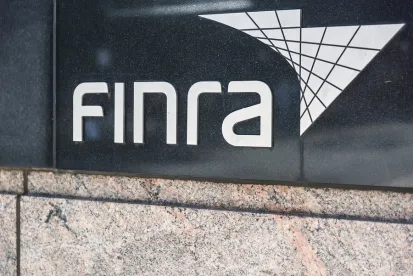On July 11, FINRA released Regulatory Notice 19-23 (the Notice),1 which provides welcome details on the ways that firms and individuals can receive credit for extraordinary cooperation in connection with an investigation in order to reduce or eliminate fines and penalties. The new guidance provides examples of how FINRA assesses whether a potential respondent's cooperation is extraordinary as distinct from cooperation expected from member firms and associated persons.
FINRA provides that firms may earn credit for extraordinary cooperation for:
-
proactively and voluntarily delivering full restitution to harmed customers;
-
proactively correcting deficient procedures and systems;
-
self-reporting violations to FINRA above and beyond what is required; and
-
providing extraordinary assistance to FINRA during its investigation.
FINRA stresses in the Notice that the most important factor in obtaining credit for extraordinary cooperation is promptly and proactively identifying any affected customers and providing them with restitution, stating that "if a respondent's misconduct has caused customer harm, it will be difficult for that respondent to obtain credit for extraordinary cooperation without making complete and timely restitution to injured customers."2
Background
Historically FINRA has recognized and rewarded firms' extraordinary cooperation on occasion when determining enforcement outcomes. 3 Regulatory Notice 08-70, released in 2008 (the 2008 Notice), provided the same four categories of extraordinary cooperation that FINRA currently recognizes.4 However uncertainty surrounded the specific actions firms should undertake if seeking this credit. Subsequent rule changes and policies enacted since the 2008 Notice, including Rule 4530(b)5 (requiring member firms to report internal conclusions of violations to FINRA), Rule 82106 (requiring cooperation in every investigation) and FINRA's Sanction Guidelines7 (outlining FINRA's principal considerations when determining appropriate sanctions), exacerbated uncertainty as to where to draw the line between cooperation required under FINRA rules and "extraordinary" cooperation. With the Notice, FINRA supplements its prior guidance and provides substantial clarity on specific actions a firm can take to demonstrate extraordinary cooperation and receive credit from FINRA.
New Details About When FINRA May Award Credit
The Notice provides new details about FINRA's decision-making process, including specific examples of behaviors that firms can undertake in four categories to earn credit for extraordinary cooperation:
-
Examples of Correcting Deficient Procedures and Systems
-
conduct independent audits or investigations to identify and remediate all related misconduct;
-
hire independent consultants or experts to ensure the adoption and implementation of improved supervisory systems, procedures, and/or controls; and
-
make organizational changes designed to prevent future violations.
-
-
Examples of Quick Restitution to Affected Customers8
-
voluntarily take steps to ensure that restitution is paid as quickly as possible, in a manner that ensures all harmed customers are made whole; and
-
pay restitution promptly of their own initiative, prior to any order by FINRA or another regulator.
-
-
Examples of Self-Reporting of Violations9
-
self-report misconduct that does not fall within the reporting requirements of Rule 4530; and
-
proactively detect and identify misconduct through compliance, audits, or surveillance prior to notice from regulators or customers.
-
-
Example of Providing Substantial Assistance to FINRA
-
fully inform FINRA about the potential misconduct, including all relevant issues, products, markets and industry participants, with information that far exceeds requirements under Rule 8210.
-
Types of Credit That FINRA Awards for Extraordinary Cooperation
The Notice provides clarity on types of credit that FINRA may award for extraordinary cooperation. FINRA may:
-
conclude that no enforcement action is warranted and close the investigation with no further action (or with a Cautionary Action Letter) if the issues have been fully remediated;
-
reduce the sanctions imposed, either by substantially reducing or eliminating any fines; and
-
decline to impose an additional condition or requirement that it otherwise would have imposed, for example by not imposing a requirement that a firm hire an independent consultant to oversee remediation.
Additional Information
FINRA pledged its own transparency in this initiative by including a section in settlement documents (Letters of Acceptance, Waiver and Consent (AWC)) that delineates the factors and types of credit that the regulator assessed in granting credit in relevant matters.
Even in the presence of extraordinary cooperation, FINRA may decide not to award credit, or it may recommend even more severe sanctions than called for under the Sanction Guidelines, due to the existence of aggravating factors, such as 1) prior disciplinary history; 2) intentional or reckless misconduct; 3) numerous acts of misconduct that continue over an extended period of time; 4) the extent and nature of the injury; 5) profiting from the misconduct; and 6) engaging in misconduct despite prior warnings from FINRA, another regulator or a supervisor.
Importantly, FINRA provides comfort that it continues to respect the attorney-client privilege and protecting the privilege will not impact the granting of credit for cooperation.
Conclusion
With the Notice, FINRA delivers long-anticipated guidelines for what constitutes extraordinary cooperation and the types of credit that FINRA may award in order to encourage firms to be proactive and cooperative in addressing deficiencies. This initiative serves both FINRA and firms/individuals' purposes by rewarding positive behavior. Remediating harm and acting swiftly, voluntarily and comprehensively to address deficiencies is the core goal of FINRA's credit-for-cooperation policy.
Sean R. Miller, a New York associate in the Financial Services practice, contributed to this advisory.
1 FINRA Regulatory notice 19-23, available here.
2 See Notice 19-23, at 6.
3 Providing respondents Credit for Cooperation predates FINRA. See NYSE Information Memorandum 05-65, September 14, 2005, available here.
4 FINRA Regulatory Notice 08-70, available on FINRA website.
5 FINRA Rule 4530, available here.
6 FINRA Rule 8210, available here.
7 FINRA's Sanction Guidelines contain several factors (in the form of "Principal Considerations") that FINRA's considers when deciding sanctions, including the following four which are directly relevant to credit for extraordinary cooperation and are highlighted in the Notice: "whether a respondent (i) accepted responsibility for and acknowledged the misconduct prior to detection and intervention by the firm or a regulator; (ii) voluntarily employed subsequent corrective measures, prior to detection and intervention by the firm or a regulator, to revise general and/or specific procedures to avoid recurrence of the misconduct; (iii) voluntarily and reasonably attempted, prior to detection and intervention by a regulator, to pay restitution or otherwise remedy the misconduct; and (iv) provided substantial assistance to FINRA in its examination and/or investigation of the underlying misconduct." FINRA Sanction Guidelines website, available here.
8 FINRA makes it clear that "when a member firm or registered representative engages in misconduct, restitution for harmed customers is [FINRA's] highest priority." See the Notice, at 6.
9 FINRA is aware of the inherent tension between self-reporting to FINRA as soon as possible and also proactively taking steps to remediate violations prior to FINRA's detection and involvement. For that reason, FINRA will consider giving credit for corrective measures taken promptly after a firm self-reports misconduct. See the Notice, at 5.




 />i
/>i

